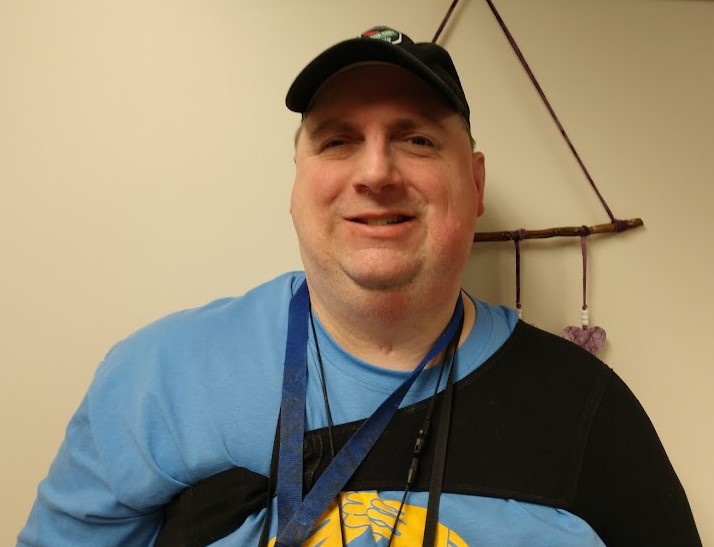“The road to recovery has not been a straight line. There are a lot of zig-zags. But that’s life. Eventually, you get where you’re supposed to be,” mused Brain Injury Program Participant Alan Demers.
 On his Facebook profile, Alan describes himself as a “disabled, divorced former Master Manufacturing Engineer working hard to discover my new life.” He started on a trajectory of engineering, attending Rensselaer Polytechnic Institute where he earned a degree in Mechanical Engineering, and promptly advanced to Rochester Institute of Technology where he earned a Master’s degree in Manufacturing Management. At the height of his career, he held positions such as Continuous Improvement Engineer and Manufacturing Engineer, but then his direction abruptly changed. Alan started experiencing headaches. Then he started losing feeling in his feet “off and on” and found himself tripping as he attempted to walk upstairs. Coworkers noticed and became concerned. They suggested that he see a doctor.
On his Facebook profile, Alan describes himself as a “disabled, divorced former Master Manufacturing Engineer working hard to discover my new life.” He started on a trajectory of engineering, attending Rensselaer Polytechnic Institute where he earned a degree in Mechanical Engineering, and promptly advanced to Rochester Institute of Technology where he earned a Master’s degree in Manufacturing Management. At the height of his career, he held positions such as Continuous Improvement Engineer and Manufacturing Engineer, but then his direction abruptly changed. Alan started experiencing headaches. Then he started losing feeling in his feet “off and on” and found himself tripping as he attempted to walk upstairs. Coworkers noticed and became concerned. They suggested that he see a doctor.
After the dust settled from the battery of tests he underwent, he was diagnosed with a brain tumor called Glioblastoma/ Astrocytoma. He recalls feeling fortunate that he was living in Delaware, close to one of the best neurosurgeons in the country who did the initial surgery. Although his tumor was found to be non-cancerous, he was referred to Boston for additional surgery to remove the tumor and the pressure inside his skull that it caused. There were complications. As Alan joked “I thought, surely they must have taken out the wrong thing.”
All his aforementioned zigging and zagging led him to Albany and Living Resources. Through his participation in our Brain Injury Program, he discovered the joy of community. He said, “I never thought I was particularly social before but I realized I really do enjoy talking with people and getting plugged into things.” Together with a fellow participant, he started a small group which they named, “You Asked for It.” In this group, which still takes place today, group members are encouraged to ask questions on a variety of topics. Participants research the questions on a computer and share the answers they find. Alan smiled. “I enjoy being a small group leader. It helps me practice getting my thoughts organized so I can lead people in discussion and keep it going. It has helped with my confidence. It helps me know I can adapt to any situation and handle anything that comes at me.”
Although Alan is proud of the progress he has made since his brain injury, he understandably longs for a time when his path will get easier. “You get kind of tired always adapting to things, you know? I want to stick to something that I can hold onto and call my own. I want to plant my feet on something.”
You can be sure that Living Resources’ Brain Injury Program Super Heroes will support him on every step of his journey, one day at a time, guiding him through the twists and turns, peaks and valleys.
Living Resources Brain Injury Services offers a comprehensive treatment program for people with traumatic or acquired brain injuries. Individuals living in the community have access to a wide range of service options including care coordination, life skills training, day programs, fine arts instruction, clinical services, and specialized services for veterans with TBI.
